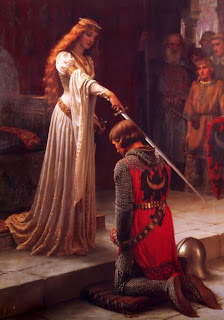
Editor's note: The following remarks were made by Mr. Weber at the March 28 induction ceremony for NHS at JPII.
A children's tale tells of a land in which a castle of valiant knights protected the people of a forest plagued by dangerous giants. These knights had silver shields created by a magician, and a knight’s shield would shine brighter the more good the knight did in the land. However, if a knight were lazy or cowardly or vain, the knight’s shield would become increasingly cloudy until the knight would be ashamed to bear it. In rare cases in which a knight showed exceptional valor and devotion to duty, a golden star would appear in the center of the shield.
One day dangerous giants gathered together to try to drive the knights from the land. Seeing their preparations, the lord of the castle gathered his knights together to ride out to battle. Young Sir Roland had only recently acquired his shield, and dreamed of distinguishing himself. But the lord of the castle ordered him to stay behind and guard the gate, to prevent anyone from entering the castle until the knights returned.
Sir Roland was very disappointed, but stood at the gate to do his duty. Eventually a lone knight rode up wearily, shield dull. The knight offered to trade places with Sir Roland, and let Sir Roland seek glory while the knight would guard the gate. Sir Roland almost leapt at the chance, but realized he had promised to stay at his post, and so he refused the offer.
In a while, an old woman approached the castle, begging for food. She said she had been near the battle, and that the knights were doing poorly. She mocked the young knight for being afraid to join his companions. Sir Roland gave the woman food, but resisted the temptation to prove to her his bravery by doing something he had committed not to do.
Next, an old man in a long cloak appeared across the moat. The man claimed to be a magician, and to have a magic sword with which Sir Roland could save his friends from destruction if he would leave the gate and join the battle in the forest. Sir Roland was so tempted that he had to move back and raise the drawbridge to cut himself off from the strange man. Suddenly, the “magician” threw off his cloak, and began to grow. He turned into a great giant, and howled at Sir Roland in frustration before turning back to the forest.
Eventually the company of knights rode back, tired but victorious. As they approached the gate they stopped in wonder. There, shining on Sir Roland’s shield, was a golden star. Some knights did not understand how someone who had not fought in battle could earn such honor. But the lord of the castle knew, and explained that some of the hardest battles of all are not against an armed foe. In disciplining himself to do his duty, Sir Roland had fought the hardest battle of the day.
-------
On behalf of the teachers and staff of JPII, I want to congratulate all of you who have been chosen to become part of JPII’s next National Honor Society. I am not sure there is a greater compliment that your school could give you than to recognize you publicly as people of honor. On behalf of the school, thank you for the example you have been. And parents, they don’t get to be the way they are by accident—thank you for helping them become people of virtue and leaders in our school.
The legend of Sir Roland is interesting, because it reminds us that being honorable isn’t so much about achieving fame or “status” among one’s peers. Sir Roland, a young man, desired to establish himself as a great knight by going to battle and performing heroically. Instead, he was asked by the lord of the castle to stay back and defend the castle, a seemingly demeaning job, which turned out to be both difficult and important.
Being honorable most often is not about being a superstar or a hero. It’s about doing your job, fulfilling your duty, being true to your word in the ordinary, everyday grind of your life.
For students at JPII, it’s about keeping your commitments, being honest in your relationships, doing your homework, being on task in class, leading peers to do the right thing when faced with the temptation to do the wrong thing.
A few moments ago, you took a vow that said you promise to “advance forward the welfare of the school.” This vow reflects an ancient view that understands that a society is only as strong as the virtue of its citizenry. All great civilizations have understood this. In ancient Greece, Athenian youth took a similar vow:
We will never bring disgrace on this our City by an act of dishonesty or cowardice.
We will fight for the ideals and Sacred Things of the City both alone and with many.
We will revere and obey the City’s laws, and will do our best to incite a like reverence and respect in those above us who are prone to annul them or set them at naught.
We will strive increasingly to quicken the public’s sense of civic duty.
Thus in all these ways we will transmit this City, not only not less, but greater and more beautiful than it was transmitted to us.
Students of the National Honor Society of JPII, may you leave the city—or in this case—JPII—greater and more beautiful, a better school, than it was transmitted to you. You are clearly on your way to doing that by virtue of your selection to NHS. My charge to you is to continue in that goal until your graduation.
Congratulations again.

No comments:
Post a Comment